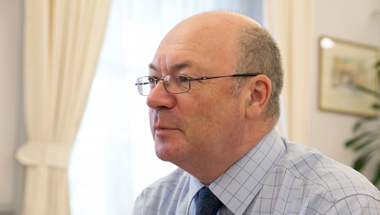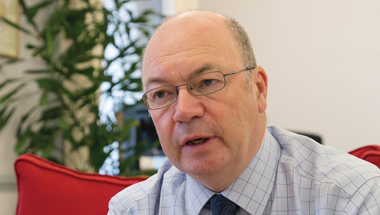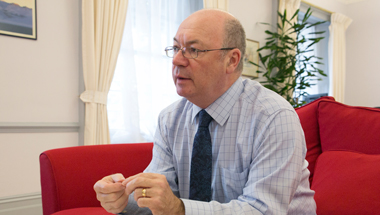The big interview: Alistair Burt
Six months into his post, the pharmacy minister sits down with the sector for the first time
The aftermath of this year’s general election was a time of speculation for C+D readers. While others pondered who would sit alongside David Cameron and George Osborne on the front benches, or how Labour would pick itself up from such a defeat, the pressing question for the sector was: who would be pharmacy minster?
Five days after the Conservative victory was announced, it emerged that Earl Howe would no longer hold the position. Whoever replaced him would have big shoes to fill – Earl Howe had represented pharmacy for five years and proven popular with pharmacists, who described him as “genuine” and a “strong advocate” for the sector.
The appointment of Alistair Burt five days later was not necessarily an obvious move. At the time of becoming minister for community and social care, which includes responsibility for pharmacy, the former lawyer had no prior experience in the health sector other than being the son of a GP.
But pharmacists were encouraged that he had more than 30 years’ experience of being an MP and expressed hopes he could be a “breath of fresh air”. Most importantly, the sector recognised that it was important to win over the minister sooner rather than later – especially at a time of turmoil and change in the health service.
Fast forward to the day of C+D’s interview with Mr Burt last month, and the turmoil shows no sign of subsiding. The Department of Health is reeling from a furious protest by junior doctors against their new contract. Pharmacists and GPs are battling over flu vaccinations. And NHS England has made headlines by questioning whether there are too many pharmacies. Healthcare professionals are feeling more vulnerable in their roles than ever – but Mr Burt is keen to demonstrate he has a clear vision for pharmacy.
|
|
“This is a group of people who are already delivering, want to deliver more and recognise that they are working in a changing system” Alistair Burt |
First impressions
You would be forgiven for questioning whether Mr Burt had any awareness of pharmacy when he became minister for community and social care. The MP for North East Bedfordshire was somewhat thrown into the deep end in his new position, which gave him responsibility for areas such as mental health and dementia.
But, encouragingly, Mr Burt says he was already familiar with pharmacy’s role in the NHS. In particular, he noted pharmacists are “very popular with members of the public”. “I came in with a background and awareness of what the profession wanted to do. Most of us [MPs] have been contacted over a reasonable period of time from pharmacists saying, ‘we can do more’,” Mr Burt explains.
For this reason, he says, he is keen to help the sector reach its potential. “There is a dynamic in pharmacy that I found really interesting and I was very pleased to feel I could help shape that over the next few years,” he says.
Talk of the sector’s future often focuses on how it can help alleviate pressures elsewhere in the health service. And, based on his own experiences, Mr Burt clearly sees the potential for pharmacy to “help out” over the next five years.
“I have been to see places where pharmacists were diverting traffic away from GPs and making sure people are doing the things they have been trained for,” he explains. But he stresses that his vision for the sector’s role isn’t just about taking the pressure off others: “The work that has been done by pharmacists is good in its own right.”
Fostering collaboration
This ringing endorsement of the sector is tentatively encouraging. But pharmacy’s evolving role isn’t sitting so well with everyone – as evidenced by the launch of England’s flu service in September. Pharmacy quickly made its mark, delivering almost 300,000 vaccinations in the first 34 days. On the flip side, GPs clearly felt put out, with some attempting to dissuade patients from visiting a pharmacy for their flu jabs.
It’s hardly an ideal outcome at a time when the government is continually pushing the value of collaboration between the professions. So what does Mr Burt see as the answer? For him, it’s about recognising that pharmacists and GPs have complementary, rather than competitive, roles. “As far as I can, I am keen to try and make the relationship not one of tension, but one of collaboration and co-operation,” Mr Burt says.
Again, he points out that pharmacists can help tackle the ever-mounting workload faced by GPs. “It should be win-win all round. It should be about who is best at doing a particular role in the health service.”
Putting this mantra into practice is easier said than done, though. In August, the Royal Pharmaceutical Society and National Association of Primary Care suggested a joint primary care contract could be a way to make a collaborative environment a reality. But the proposal faced strong opposition from the Pharmaceutical Services Negotiating Committee (PSNC), which warned it could remove “vital” financial protection for contractors.
Mr Burt tends to err towards PSNC’s way of thinking. “I’m not sure a joint contract is the right vehicle,” he says. Instead, he is keen to focus on the less dramatic solutions available – namely, the NHS England scheme to place at least 375 pharmacists in GP practices, to which it has committed £15 million. “I am very keen to see practices that want to take on pharmacists have the opportunity to do so,” says Mr Burt. “Let’s see how the present system goes first.”
|
|
“It is important to us that the profession has the freedom and discretion to do its job. Mistakes will occur and it is essential that this is separate from mistakes that have a more malicious intent” Alistair Burt |
Funding future
The one criticism of the practice pharmacist scheme is that it focuses too heavily on surgeries, and not enough on community pharmacy businesses. The initiative will do little to deter the patients still attending GP practices with minor queries, critics argue. An obvious solution to this is a national minor ailments scheme – the subject of failed negotiations in July. Feelings are clearly still running high over the frustrated service bid: when C+D asked readers on Twitter to share their questions for Mr Burt, most of them related to the lack of national framework.
The minister’s response is somewhat tentative. He stresses that, “to be very straightforward”, the decision over a national service lies with NHS England, not him. He is at pains to point out that he “can’t make any claims about what NHS England might do in terms of commissioning”.
But the pharmacy minister reveals he is looking at minor ailments services very carefully. “I’m interested in the topic and we are very supportive of clinical commissioning groups (CCGs) where they are already operating these,” Mr Burt says. He is “keen” to look at the lessons learned from these local services, adding: “Let’s see what’s there.”
But Mr Burt is equally keen to stress that pharmacy will have to justify any funding that comes its way. The NHS can’t continue spending its £100 billion health budget effectively “doing the same thing, the same way” and everyone will have to fight for its share, including pharmacy.
“I get a sense from pharmacists that they expect that to be the case, as they are constantly looking at ways to revise what they do,” Mr Burt says. “I just can’t go anywhere in the sector and say, ‘you’re a special case’, but no one is expecting that.” He makes it clear the issue runs far deeper than one particular sector: “We have to be efficient across all areas of the health service.”
Branching out
So if pharmacists are to receive more funding, it is clear they will have to be willing to take on more work. One potential area for expansion is mental health – something of a hot topic in the last election. This was a particularly important area for Mr Burt’s predecessor as care minster, Liberal Democrat MP Norman Lamb, who this week launched a campaign to put it on a par with physical health. So does Mr Burt see a role for pharmacy in improving mental health care?
Mr Burt reveals he has asked for information on how equipped pharmacists are to deal with mental health issues. “I want to see what the pharmacy profession is doing in terms of its own training and awareness,” he says.
Of particular interest is the sector’s role in increasing medicines adherence, which is notoriously problematic in drugs such as antidepressants. He highlights it is “very important” that pharmacists can assist people in continuing to take their medication – a role that mental health experts have been keen for the sector to assume more widely through the new medicine service.
“Pharmacists could play a real role in making sure that people understand why it is so important that they keep taking their medicines,” he says. Their regular contact with patients also enables them to see “when it’s not going so well”, he points out. With “an increased awareness of mental health”, Mr Burt says he hopes society will be able to talk about it “more openly”.
|
|
“Pharmacists could play a real role in making sure that people understand why it is so important that they keep taking their medicines” Alistair Burt |
Action points
So far, so positive. But pharmacy is used to warm words from ministers. Action is more difficult to come by, as demonstrated by C+D’s last interview with former pharmacy minster Earl Howe in 2014. Back then, the sticking point was the issue of stock shortages. Despite receiving evidence of patient harm from C+D and the all-party pharmacy group (APPG), Earl Howe told C+D he believed the government was dealing with stock shortages “very effectively” and rejected the APPG’s call for patient anxiety to be classed as harm. Fifteen months later, and there is little evidence of the shortages easing. In fact, pharmacists seem to have accepted shortages as an inevitable part of their working lives. So is Mr Burt equally unwilling to accept their impact?
His answer is something of a U-turn for the government. Mr Burt doesn’t dispute that the issue causes patient harm, saying: “Of course it does.” He also stresses that the government takes shortages “very seriously”. But, although their impact “isn’t to be minimised”, he doesn’t reveal whether the government will be reanalysing the evidence concerning shortages – leaving a question mark over whether action will be taken.
His response to another matter that is crying out for action rather than words – the long-running attempts to decriminalise inadvertent dispensing errors – is more encouraging. Removing the threat of prosecution matters “very much” to the government, he says. “It is important to us that the profession has the freedom and discretion to do its job. Mistakes will occur and it is essential that this is separate from mistakes that have a more malicious intent,” he stresses.
And when Mr Burt says the government is “keen” to finally change legislation, there is hope these are not just empty words. After all, the APPG revealed last month that parliament is expected to consider decriminalisation of dispensing errors before Christmas.
Speaking to Mr Burt, he comes across as focused and informed. He may not have all the answers – stock shortages being a prime example – but he seems to have made it his business to get to know the sector. The fact that he is willing to listen to what pharmacy can do in areas such as mental health and minor ailments suggests the profession has gone some way towards winning him over in his first
six months.
Pharmacy may not be able to expect any guarantees or special treatment, but Mr Burt appears to be on its side. As he says: “This is a group of people who are already delivering, want to deliver more and recognise that they are working in a changing system.”






